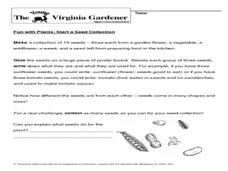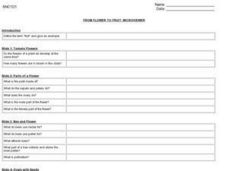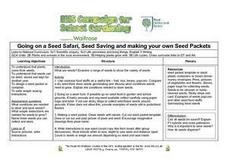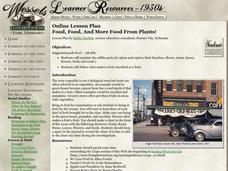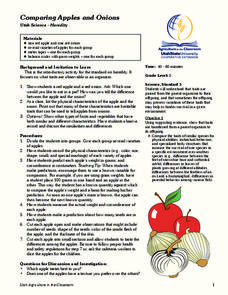Curated OER
The Seed Match
Students examine seeds and predict the plant it comes from. In this seed match lesson, students match seeds to plants and then see if their predictions are correct. Students predict the number of seeds found in plants as well. Students...
Curated OER
Parts of the Seed
In this biology worksheet, students read about the parts of plant seeds and look at a seed diagram. They read about the roots, endosperm, embryo, and the process of germination. They answer 8 online multiple choice questions based on the...
Curated OER
Seed Dispersal
Students determine seed dispersal methods. In this life science activity, students make predictions about how seeds might move, then look at seeds under micrographs or microscopes to analyze the seed coat and how this helps dispersal. ...
Curated OER
Seed Sorting 101
Students sort through numerous seeds to find similarities and differences. In this sorting and classifying instructional activity, students divide up different plant seeds based on their similarities and differences, while keeping record...
Curated OER
Seed Structure and Seed Dispersal
Third graders plant seeds. In this seed structure activity, 3rd graders identify parts of a seed and plant a lima bean seed. Students discuss and reflect on the process in their journals.
Curated OER
Estimation of Population Growth by Counting Offspring: Seed Multiplication
Students analyze a multi-seeded fruit, such as tomato, pepper, squash, watermelon, etc. They remove and count the seeds from the fruit and hypothesize/calculate the reproductive rate of that organism.
Curated OER
Growing Tomatoes From Seed Activity
In this growing tomatoes worksheet, students plant tomato seeds in February, and follow their growth through the summer break. They observe and investigate the plant growth from seed to plant.
Curated OER
Seed Plants: Gymnosperms
Students identify what makes up a seed. In this gymnosperms instructional activity students identify conifers and explain how they reproduce and what the importance of gymnosperms are.
Curated OER
The Seed and I
Students examine the patterns and structures of seeds and fruits. Using different types of organisms, they identify the similiarities and differences between them. They create their own seed design and shares it with the class.
Curated OER
Start A Seed Collection
In this start a seed collection worksheet, students collect, label and display 15 seeds 3 each from a garden flower, a vegetable, a wildflower, a weed and the kitchen, and observe the differences.
Curated OER
What is Inside a Seed?
Middle schoolers observe how the bean seed has changed after being soaked in water overnight and record their observations. They open the bean and observe the inside. Finally, students draw and label the parts of a bean seed and write...
Curated OER
Importance of Fresh Vegetables and Fruits in Our Diets
Students explore the importance of fruits and vegetables in our diets. In this science lesson, students discuss various types of fruits and vegetables. Students play the good health=good diet game. Students discuss types of fruits and...
Curated OER
From Flower to Fruit: Microviewer
In this From Flower to Fruit worksheet, students define several terms as it relates to flower development and the parts. Students describe the process used by bees for pollination of flowers.
Curated OER
Six Plant Parts
Students create a harvest burrito out of fruit, flowers, roots, stems, and more. In this plants lesson plan, students go out into the garden and identify the 6 plant parts.
Curated OER
Cut Open Fruit With Seeds Picture
In this fruit coloring page worksheet, students study a picture of an unidentified cut open piece of fruit. The seeds are visible. Students color the picture.
Curated OER
Pumpkins
The pumpkin might be the single most amazing plant for youngsters. It's so big! It's leaves, it's stems, it's fruit! And it is easy to grow! This instructional activity describes all sorts of wonderful pumpkin ideas. Everything from...
Curated OER
Seed Sensation
Students explore seeds through dissecting, sorting, comparing and contrasting. They draw their observations of both a closed and open seed and then they label the parts of a seed. They brainstorm where seeds come from. They compare seeds...
Curated OER
Seed Diversity
Students explore agriculture by researching different seeds. In this seed identification lesson, students collaborate in small groups to analyze a package of different seeds. Students utilize a magnifying glass to examine each seed...
Curated OER
Going on a Seed Safari
Students describe biology by identifying different plants in class. In this seed lesson, students discuss the process of how a plant grows from seed to leaves. Students attend a field trip to their garden or another park and collect a...
Curated OER
Food, Food, And More Food From Plants!
Students examine the edible parts of a plant and explore their function. They define what makes a fruit classified as a fruit. They create a sketch or map or photo of a 1930s farm and justify their plant selections.
Curated OER
Fun with Plants Flower Power
Students understand the parts of the flower. In this flower lesson, students perform experiments to see where seeds come from. Students complete a data sheet about the experiment. Students understand the terms pistil and stamen.
Curated OER
Comparing Apples and Onions
Fifth graders observe and compare apples. In this apples instructional activity, 5th graders work in groups to record the physical characteristics of a variety of apples. Students predict each apples weight and then weigh them to see if...
Curated OER
How Do Plants Meet Their Needs?
In this plants worksheet, students will compare and contrast the purpose of the flower, fruit, and seeds of a plant. Students will fill in the blank of 5 statements in this graphic organizer.
Agriculture in the Classroom
Pumpkins... Not Just For Halloween
Celebrate fall with four pumpkin themed hands-on activities! After learning about pumpkins, scholars complete two activity sheets that reinforce estimation and word problems. They then plant pumpkin seeds and bake a pie in...











